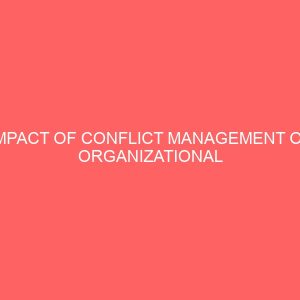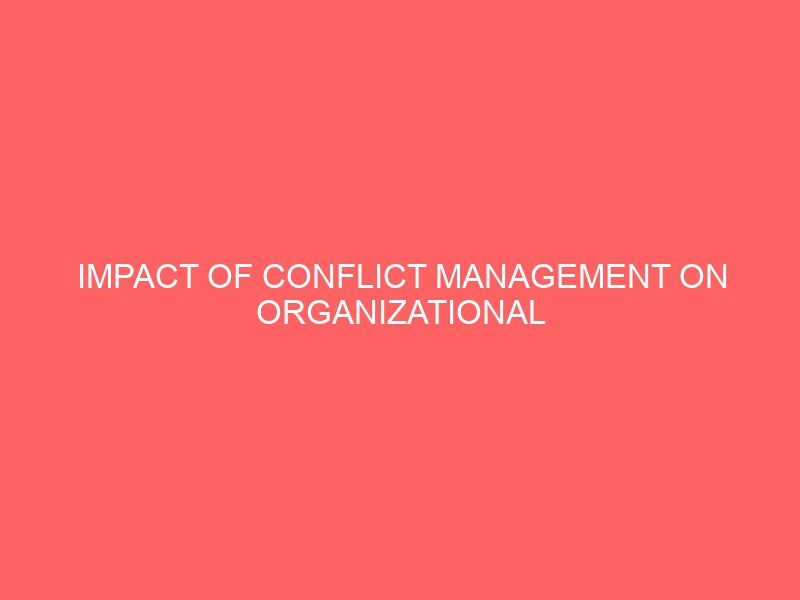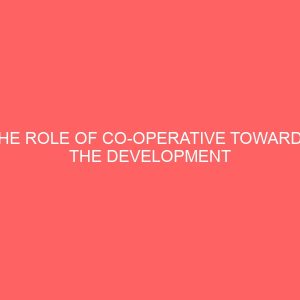Description
CHAPTER ONE
INTRODUCTION
1.1 BACKGROUND OF THE STUDY
This research work is on Impact of conflict management on organizational efficiency, a case study of first bank plc. Conflict is a regular feature of formal organizations which results from divergences in interests of individual workers and management. Because individuals differ in their values, attitudes and goals, conflict among them becomes unavoidable. Conflict occurs at both individual and collective levels, personality and other structural factors coming into play. Obisi (2005:47) observes that there is intra-management conflict just as conflict situations do occur between and among groups of workers and their organizations as well as between individuals.
Two types of conflicts at work have been distinguished. These are organized and unorganized conflicts. Otobo (2005:125) expresses that organized conflict forms part of a conscious strategy to change the situation which is identified as source of discontent. This type of conflict is thus a group activity, involving deliberate decisions taken at a mass meeting or by selected representatives of affected staff. In unorganized conflict, the worker responds to the situation in the only way open to him as an individual, that is, by withdrawing from the source of discontent, or in reaction engaging in sabotage and rudeness Agwu (2006: 12) argues that such reaction rarely derives from any real calculative strategy. Indeed, unorganized expression of conflict are often, not regarded as conflict by the persons in the situation. This is why most people may not ordinarily associate acts of rudeness with being in a state of conflict. Quite often such rude behavior may be attributed to “bad mood” and similar psychological states of mind. Conflicts in organizations, whether organized or unorganized individual or group, need to be managed effectively because of their effects on the organization.
Conflict situations affect the overall effectiveness of co-operate organizations in the sense that they cause disharmony among organizational participants impacting negatively on organizational performance. This is because useful time and resources are wasted during conflicts in organizations. Nevertheless, we have to bear in mind than on organization is immune to conflict within itself since every organization is made up of different individuals with diverse interests, goals, ideas and temperaments and it is very difficult to harmonize these divergences. As a corollary, interests and goals usually conflict between the individuals and the management team as well as within the management team members.
Conflict management is an important aspect of corporate management. Ugbaja (2002:111) notes that the aim of conflict management is not to create an ideal corporate situation since that is not attainable given the divergences in the individuals goals, etc. However, conflict management systematically uses the available conflict resolution strategies to build an effective mechanism for conflict management in corporate organizations. Although there may be existing mechanism and procedures already in place to deal with conflicts whenever they occur, some organizations with reactive managers rise to the situation when it occurs. Dunlop (2002:321) expresses that the virtues of organizational harmony underscores effective conflict management which is indisputable to effective organizations performance. For this reason every corporate organization strives to ensure good work environment in which relationships among workers on the one hand, and workers and management on the other are cordial and appreciated by all the organizations participants. The banking industry is one such sector where conflict management is not only essential but should be effective given the institutions‟ vulnerability to huge financial losses whenever there is conflict. Against this background, therefore, this study is set to examine conflict management in the United Bank for Africa, Plc with a view to determining its impact on its performance.
1.2 STATEMENT OF PROBLEM
Conflicts in organizations have destabilizing effects on the overall performance of the organization. It leads to under performance since valuable time and resources (human and material) are used in controlling and managing conflicts rather than in enhancing output and productivity. Conflicts also lead to interpersonal disharmony in the organization which makes attainment of organizational goals difficult. Attaining organizational goals is possible if efforts are always made to reduce the overall level of conflict within the organization. Consequently, it is very imperative that efforts are made towards finding ways of effectively managing conflict so as to achieve organizational objectives. The problem of poor conflict management in corporate organizations with particular emphasis on UBA and First Bank of Nigeria, Plc is the focus of this study.
1.3 OBJECTIVES OF THE STUDY
The objectives of this study are;
- To identify the causes of conflicts in corporate organizations.
- To examine the different strategies of conflict management in organizations.
- To determine the extent to which these strategies are effective.
- To determine the impact of conflict on workers productivity.
- To determine the impact of effective conflict management on organizational performance.
1.4 RESEARCH QUESTIONS
The following questions will be addressed in this study; i. What are the causes of conflicts in corporate organizations? ii. What are the different strategies for conflict management in organizations? iii. To what extent are the strategies effective? iv. What is the impact of conflicts on workers‟ productivity? v. What is the impact of effective conflict management on organizational performance?
1.5 HYPOTHESES
The following hypotheses are postulated for this study;
- Ø Ho: Organizational conflict does not arise from poor superior-subordinate relationship.
H1: Organizational conflict arises from poor superior-subordinate relationship
- Ø Ho: Organizational conflict does not hamper workers‟
H1: Organizational conflict hampers workers‟ productivity.
- Ø Ho: Effective conflict management does not enhance organizational performance
H1: Effective conflict management enhances organizational performance.
1.6 SIGNIFICANCE OF THE STUDY
This study is very important in several respects. Firstly, it will be beneficial to management in all corporate organizations. This is because conflict has become a regular and frequent feature of corporate organizations. By investigating the causes of organizational conflicts the study will be able to find out how the conflicts will be minimized since they cannot be completely avoided. Besides, in examining the causes of conflicts, the study will be able to determine why they re-occur.
Furthermore, by examining how conflicts are managed, the study will be able to find out the limitation of the strategies. All these will provide the basis on which recommendations will be made for the benefit of management.
Secondly the government will also benefit from the study. As conflicts occur at organizational level so do they occur in the public sector level. The findings of this study will be very useful to the government in formulating effective strategies for managing conflicts in the public sector.
Thirdly, employees in both the private and public sector organizations will also benefit from this study. This is because it will show how their intra and inter-relationships bring about conflict and how they can accommodate one another or what approach to adoption order to avoid conflicts.
Fourthly, union leaders will also benefit from the study. This is because the findings will show how they can use their positions in helping to ensure sustained harmony in corporate organizations. Finally, the study will be useful for academic purpose. This is because students who will carryout related studies will use this project report as a reference material.
1.7 SCOPE AND LIMITATIONS OF THE STUDY
This study focuses on Impact of conflict management on organizational efficiency. No doubt, it will be practically difficult to cover all organizations in this study. Hence, the scope of the study is restricted to first bank of Nigeria Plc, Enugu. The following are the limitations of the study;
- Uncooperative attitude of some of the staff of First Bank, Plc who refused to complete the questionnaires given to them or to be interviewed for fear of official reprisal. Their refusal to cooperate adversely affected the amount of data collected through primary sources.
- Financial Constraint: The study could have been very extensive if more organizations were included. But the researcher could not afford the cost involved. Thus, the study is restricted to only one corporate organization.
- Time Constraint: The researcher could not complete the study within a record time because of the pressure of other academic works on her.
1.8 DEFINITION OF TERMS
Conflict: This refers to a situation of disharmony and grievance.
Organization: This refers to a combination or group of people who work together to achieve a goal.
Idiosyncrasy: This refers to a set of attitudes, behaviors and values which characterize an individual.
Goal: This refers to a set objective.
Goal congruency: This is a situation of overlapping personal interests.
Strategy: This is an approach or measure adopted in order to achieve a goal.
Corporate Organization: This refers to a business entity.
Disharmony: This refers to a situation of absence of togetherness.
Management: This refers to the art of planning, organizing, directing and controlling. It also refers to decision-makers in a corporate organization.







